SURA 2018 Student Blog
Get all our news
Each summer since 1998, the Institute for Policy Research (IPR) has run the Summer Undergraduate Research Assistants (SURA) program, which gives undergraduate students first-hand experience in the conceptualization and conduct of policy-relevant social science research. This year, SURA students are sharing their research experience from their own perspective, and we will feature students discussing the research projects they are part of throughout the summer.
Read student blog posts by:
Dylan Doppelt (WCAS 19) | Thalia Perez (WCAS 21) | Ericka Woods (SESP 20) | Jonathan Sun (SESP 21) | Dakota Baker (WCAS 19) | Alex Carther (WCAS 19)
Dylan Doppelt: Understanding Political Gridlock
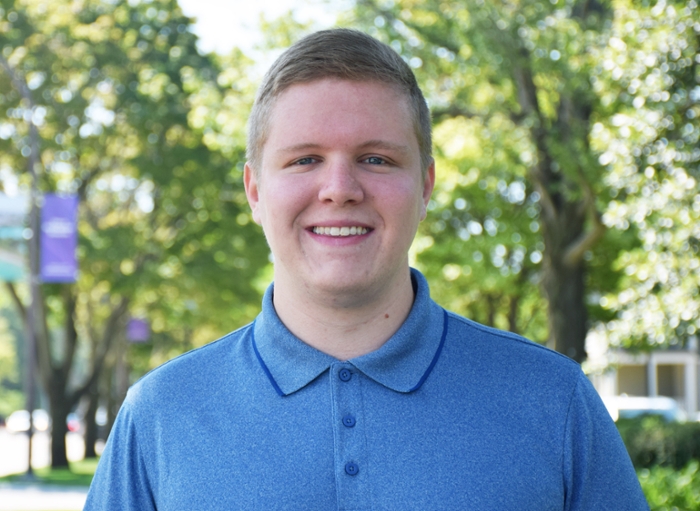
Dylan Doppelt is working with IPR's Laurel Harbridge-Yong on researching congressional inaction.
I have always had a fascination with American politics. From watching the 2008 campaign unfold as a bright-eyed sixth grader to voting in my first presidential election nearly two years ago as a sophomore, the political process has been nothing if not interesting and informative in recent years. That is why I have been so excited to work with IPR political scientist Laurel Harbridge-Yong this summer on her research into congressional inaction—which might be to blame for the never-ending gridlock in our legislative institutions.
Our work on this project has focused on the newsletters that members of Congress regularly send out to their constituents. While a wide variety of topics are often covered in these newsletters, we have been looking for members who talk about inaction in Congress. That includes things like a bill failing a vote in the House or Senate or the president vetoing legislation.
We often hear about gridlock happening in Congress from the news as well as politicians with polished talking points, but it can sometimes be hard to tell why inaction is happening and who is actually to blame for it. Some voters may look to their own representatives for clarity on this issue, so it is especially important that we understand the explanations that members of Congress are providing to their constituents when all the cameras are off.
To look for these instances of inaction, we use an online system that automatically searches through a database of nearly 40,000 congressional newsletters collected since 2013. This system looks for words like “blocked,” “ignored,” “gridlock,” “veto,” and “failed,” among many others, to single out newsletters that are the most likely to talk about inaction. From there, I analyze the newsletters to confirm if inaction is mentioned, what inaction they’re talking about, who they blame it on, and if they view it as positive or negative.
All of this data will ultimately be used to try to understand why members of Congress talk about inaction so much and if that is a useful rhetorical strategy to win reelection. The work can be tedious at times, especially when you are on your 112th newsletter of the day, but if there’s anything I’ve learned about social science research this summer, it’s that the most tedious work is often the most important and garners the most substantial data.
The most surprising early finding from my analyses has been the frequency with which members of Congress tout inaction and gridlock as a good thing. This may initially seem counterintuitive, but for a 2009 Republican trying to stop President Obama’s agenda or a 2017 Democrat trying to stop President Trump’s agenda, preventing any legislation or votes from moving forward may be a smart political calculation.
I’m grateful to have had this opportunity to work with Professor Harbridge-Yong through the IPR SURA program, and I’m excited for the ultimate conclusions drawn from the data I’ve collected this summer. I’m at an important crossroads in my life, deciding between law school, graduate school, and any number of post-undergraduate options. While the decision remains as tough as ever for me, my work this summer has served to reaffirm my passion for politics, and I hope to continue doing work like this well into the future.
Dylan Doppelt is a rising senior from Chicago’s West Side majoring in political science and international studies with a minor in legal studies. He decided to get involved with research because he wanted to understand why things happen in politics, not just how they happen. He hopes to remain politically involved after graduation, attend law or graduate school, and continue travelling the world.
Thalia Perez: Addressing Health Inequalities
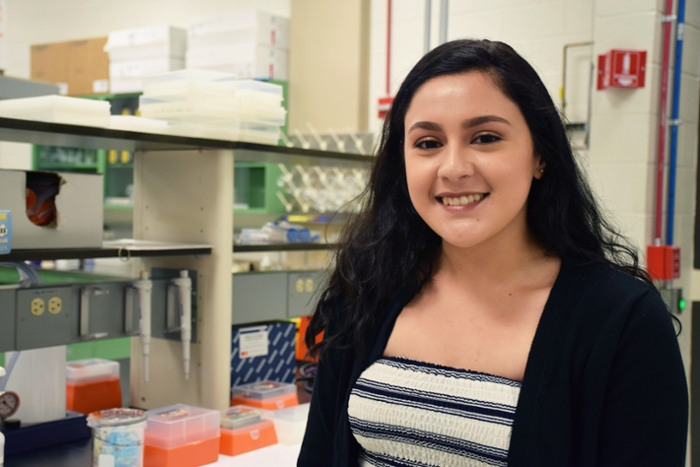
Thalia Perez is working with IPR's Edith Chen this summer, examining how social factors affect people's health.
As an aspiring physician, I have always been drawn to science and believed that my first research experience as an undergraduate at Northwestern would have involved working in a biology or chemistry lab. Instead, I am happily assisting IPR health psychologist Edith Chen on psychology research projects as my first exposure to the research world.
During the fall, I was first introduced to the field of health psychology when I took Dr. Chen’s course in this topic. Although I have an immense interest in the physical sciences, I looked to balance my studies with classes that cater to the social aspect of being a physician. I believe the key to medically serving others is understanding their communities and how social factors affect their health, so Dr. Chen’s class seemed like the perfect course to shape my mindset surrounding health inequalities. Not only was health psychology my favorite course of fall quarter, but I was presented with the opportunity to work at the Foundations of Health Research Center, where she is one of the principal investigators. I am able to combine biology and psychology there by working on projects that seek to outline the correlation between social factors, such as socioeconomic status and race, to physical health. Like all projects here, health outcomes are quantified by taking blood samples and analyzing levels of cortisol and other indicators of stress. Data is also collected by having participants provide information about their lifestyle through questionnaires and interviews, and I could not be happier with being able to combine both of my interests.
I learned the ropes of working at a research lab throughout spring quarter, but I was able to apply what I learned more confidently this summer. Moreover, I have been a part of the development of a new research project called On the Rise. This project focuses on African American youth, a demographic that stood out as a subgroup in one of Dr. Chen’s previous studies regarding socio-economic class and health. In this subgroup, high-achieving African American youth from low-income families seemed to have higher cardiovascular risk compared with other low-income racial/ethnic groups. While other low-income groups developed coping mechanisms to buffer the stress associated with socioeconomic struggle and improve their health, outwardly resilient African American youth still demonstrated underlying health risks. On the Rise aims to determine whether racial discrimination is another stressor on top of economic disadvantage that has an effect on African American youth’s health and ability to cope with heightened stress levels.
Health inequalities stemming from differences in everyday life, environment, and access to resources calls for individualized prevention methods just as it would medical care. This makes the many therapies, coping groups, and low-income support programs being developed so important because studies like On the Rise demonstrate that alternate approaches to prevention are needed to address elevated health risks for at-risk groups. If it is the case that African American youth are experiencing higher stress levels, then the next step might be to find an alternative resource, such as mentoring, that can help youth alleviate the stress through finding trust in a role model. Amazingly, the Foundations of Health Research Center is also conducting studies on the benefits of mentoring on both mentors and mentees, so there could be results that support mentoring as a possible resource.
The beauty of working on a social science research project has been seeing new questions emerge and then seeing them addressed. As I mentioned, the central question for On the Rise came from a previous study, so I am learning how to analyze results and learn ways to expand or tinker with studies to discover new information. I am incredibly impressed with the hard work that goes on at the Foundations of Health Research Center, and I now have an idea of the time, effort, and passion it takes to develop and execute impactful research projects.
Thalia Perez is a rising sophomore from Chicago and is majoring in biology on the pre-med track. She decided to get involved with research because she believes it is significant for informing policy and improving the quality of life for others in the long run.
Ericka Woods: Examining Biases and Human Behavior
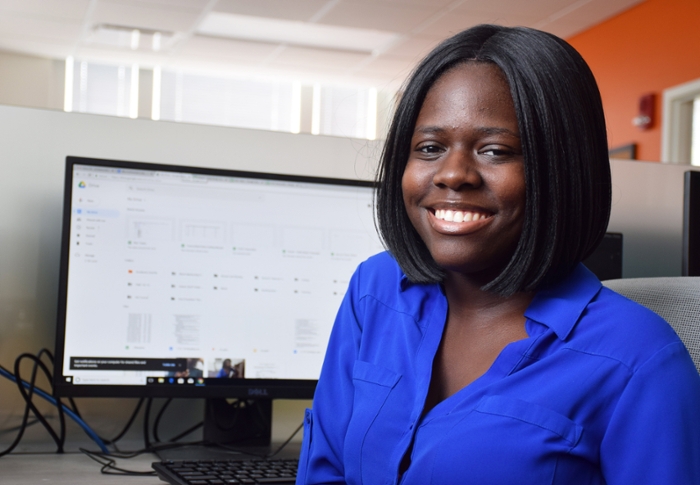
Ericka Woods is working with IPR associate Sylvia Perry to understand how children interact with other children who are different from them in various ways.
This summer, I wanted to get research experience because I’m interested in becoming a professor or working in policy research and analysis—both of which involve a lot of research. So, I wanted to get my feet wet.
I'm working on a project in psychologist and IPR associate Sylvia Perry’s Social Cognition and Intergroup Processes (SCIP) lab, where we are looking to explore how children learn to talk about, interact with, and relate to people who are different from them in a number of ways, such as weight, physical abilities, ethnicity, and other factors. We are studying this by looking at how parents interact with their children and talk to them about people that are different from them. With the knowledge that we gain from this project, we can learn how to better raise and talk to children in ways that don't influence bias or prejudice.
Based on my personal observation while overseeing data collection, when observing a child doing something nice for another child, it seems like children and parents sometimes will often attribute it to the child just being a good person, whereas when observing a child doing something mean or showing prejudice against another child, children and parents often attribute it to external factors, like having learned it from their parents, the media, or past experiences.
I’m glad IPR has given me the opportunity to delve deeper into research and work in a lab. I’ve never worked in a lab before, so I didn’t really know what to expect. Often times, when people think of labs, they think of sterile, white rooms with test tubes and lab coats. This was not my experience at all—well, there were some lab coats. My experience in the SCIP lab has shown me that research is not all big numbers and hard sciences. When it comes to social science research, it is also about people and human interaction. It is about knowing how to deal with the complexities that come with human behavior, and if you don’t know how to deal with those behaviors, learning how. Additionally, when doing social science research, I learned that a research question can lead to five other questions, and you might not have time to explore all of them in the current moment. You might have to leave them for future projects, which is actually pretty exciting!
Ericka is a rising junior from the Chicago’s South Side majoring in social policy, with minors in African-American studies and business institutions. In her free time, Ericka enjoys tutoring and also volunteering at an animal shelter. She also currently serves as secretary for For Members Only, Northwestern's Black Student Union, as well as vice president for the Women's Residential College.
Jonathan Sun: Studying the Stories of Educators
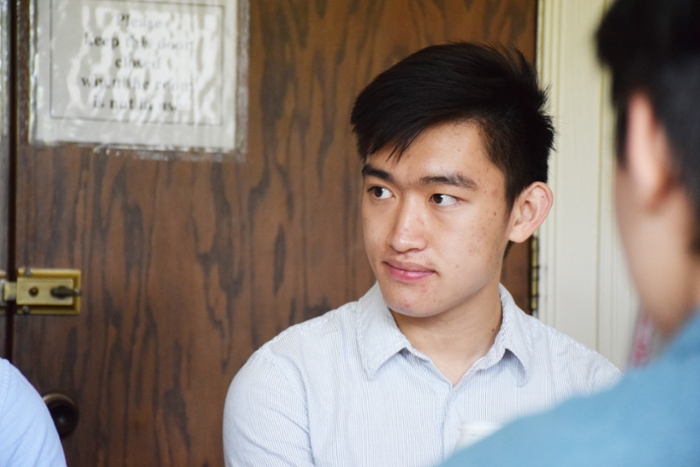
Jonathan Sun is examining the experiences of school staff and administrators and learning about the challenges educators face, like urban poverty and budget issues.
Research isn’t just about the numbers. During my time at IPR, I have had the opportunity to pore over hundreds of pages of interviews, rich with the stories of teachers and administrators across the country. My work has taught me how school and system actors develop curricula, manage stakeholders, and implement reforms. Equally as important, it has led me to ask about their motivations in doing so.
I began working with my principal investigator, education professor and IPR associate James Spillane, during the fall quarter. The projects I am working on now examine the experiences of staff and administrators through the lenses of organizational change and school system interdependence. When I started, I had the task of coding data, the process of electronically annotating interview transcripts for later use in identifying and analyzing broader trends. Coding is a time-intensive process, and it is not very fun. To keep myself engaged, I began paying close attention to the narratives of these educators, rereading interviews I had already finished two or three times over. These were compelling stories of urban principals facing extreme poverty, chronic budget crises, and district leaders who seldom seemed to understand the magnitude of the challenge—and yet so many of these principals persisted. I had to know why.
This is one of the phenomena that Professor Spillane has devoted much time and effort to understanding. As my involvement in the project grew, he began guiding me toward understanding educators’ motivation through the lenses of metaphor and vocation, both aspects of sensemaking theory. To keep up with our weekly meetings, I picked up books on sensemaking and sifted through academic journals. What I learned is that sensemaking is about stories, and it’s about telling them in order to understand both ourselves and the world around us. Russian novelist Leo Tolstoy wrote about sensemaking in War and Peace. Professor and former Labor Secretary Robert Reich called for policymakers to recognize its importance in The Lost Art of the Democratic Narrative. I use it when I apply to clubs, write essays for class, sit in a coffee shop chatting with a friend. Sensemaking is everywhere.
I studied under a Russian literature professor who once ascribed the value of literature to the self-reflection that it could foster and the connections it could create. Why not apply the same reasoning to social science research? The lessons we learn from studying people’s stories do not have to end at deciding which policy to reject and which to implement. Qualitative research lets us study stories that are here and now—and very much alive.
Jonathan Sun is a rising sophomore in SESP majoring in social policy. He hopes to attend law school, combining his interest in the legal profession with his passion for education reform. When not in the library, he enjoys swimming and visiting different Chicago neighborhoods.
Dakota Baker: Learning the Research Ropes
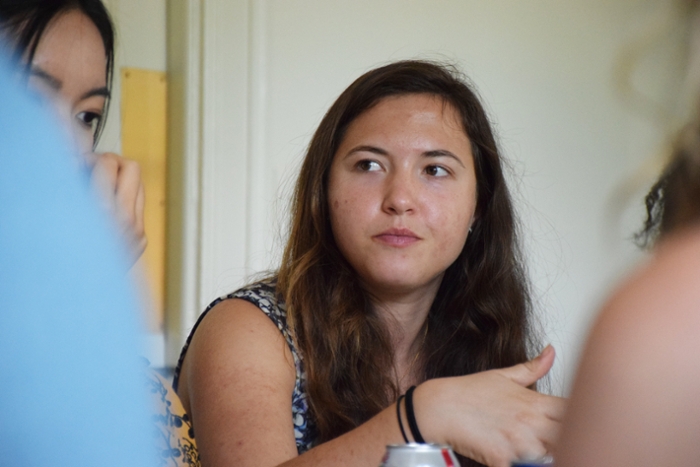
Dakota Baker discussed her research project at the annual SURA lunch.
I transferred to Northwestern last year from a small liberal arts college, looking for research opportunities in public policy. My heart has been set on the field since freshman year, but it took some time to realize that my school couldn’t offer the kind of research experience that I wanted. I found just what I was looking for at Northwestern’s Institute for Policy Research and its Summer Undergraduate Research Assistant Program.
I am working with sociology professor Andrew Papachristos on his Northwestern Neighborhood Networks (N³) Initiative. Papachristos’ research applies social network analysis to gang-related gun violence. N³ focuses these research methods on violence and policing in Chicago and the communities surrounding Northwestern. I have been working on two main tasks: an historical review of street outreach work in Chicago, and a summary analysis of Chicago violent crime data. This research will be invaluable to community leaders and policymakers who want to effectively mitigate violence and help support at-risk youth.
I have no prior experience in the study of gangs or urban violence, so it’s been a very exciting—though at times sobering—learning experience. I have been learning so much from every article I read and every dataset I poke around in. But despite lack of experience with the specific subject area, I have found that my technical research skills from coursework in other fields, as well as my general study skills, are essential to this kind of work. It has been great to exercise and further develop these outside the classroom.
Dakota Baker is a rising senior from Palo Alto, California. She is majoring in economics and minoring in math in the Weinberg College of Arts and Sciences. She plans to pursue a career in public policy analysis, possibly focusing on housing or other social welfare policy. She hopes to attend graduate school, and enjoys community theatre and international travel.
Alex Carther: Mapping Student Environments
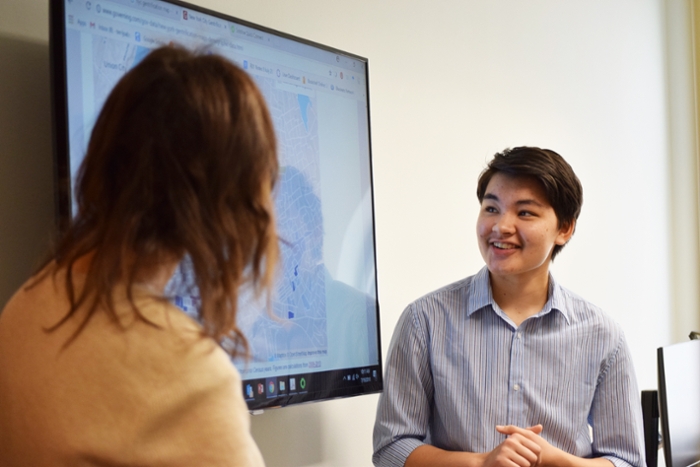
Alex Carther, right, is working with IPR developmental psychologist Terri Sabol this summer.
It might be summer break for children across the country, but here in the Development, Early Education, and Policy (DEEP) lab, research on child outcomes hasn’t stopped. Under IPR developmental psychologist Terri Sabol, the DEEP lab continues to conduct research into factors—both inside and outside of school walls—that impact children’s performance in school. About a month ago, as classes were ending, I joined the lab as a research assistant. Since then, my work here has begun to expand not only my research skills, but also my understanding of the social sciences.
As an Economics major, joining a project centered on education and human development felt daunting—I wasn’t sure if any of my previous research skills would apply. However, within the first week, I began to understand that the breadth of knowledge applied to research projects extends far beyond their central focus. Although the DEEP lab’s goals lie in understanding how contexts around schools impact the effectiveness of children’s early education, those contexts lend themselves to a variety of disciplines. Our research isn’t confined to just education and child development; it also involves gentrification, geography, green space, socioeconomic status, walkability, neighborhood crime rates, and more in order to fully understand the influences on children in our studies.
Though this list of factors might seem unrelated, each part is vital to building the big picture of school contexts. We use this data to answer questions about how environments impact children. For example, as they walk to and from school, do they feel safe? Do they see open green spaces or businesses with broken windows on their way home? Is gentrification disrupting their community? All of these things can affect a child’s development and performance at school, meaning that they are all essential to a study of early education. An integral part of my work with the DEEP lab is collecting data on these subjects so we can build up a bigger picture of the environment our students live and learn in. Then, we’ll be able to use that data to analyze which factors have the greatest impact on student’s learning environments, which can be used to inform public policy and make education more effective.
Of all the work I’ve done so far, I’m most excited about the maps we’ve been creating for each of our school sites using a program called ArcGIS to study our factors geographically. In ArcMap, we can take our data and represent it visually, creating a new and unique perspective to understand our work. This is especially helpful given the heavy emphasis on geographic contexts in our study. For example, looking at raw data on the size of green spaces in an area isn’t nearly as effective as being able to see that data displayed on a map, where the patterns and trends clearly stand out.
Working with the DEEP lab has been a truly insightful experience. As an aspiring academic, I love being able to not only observe but also participate in the process of developing new knowledge. Foraging in a new discipline this summer has given me a new appreciation for the flexibility of social science research skills, and I’m excited to further explore this field.
Alex Carther is a rising senior at Northwestern majoring in economics with a minor in math. He hopes to pursue a doctoral program in economics or public policy after graduating and aspires to a career in academia. This summer, he is participating in SURA to gain a better understanding of research in the context of public policy.
Published: August 29, 2018.